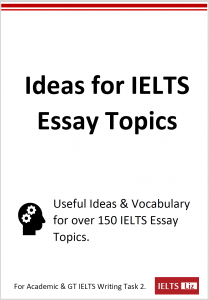Can you ask the examiner questions? This page explains clearly about asking the examiner questions in each part of the IELTS speaking test. Learn what questions can you ask and which you can’t ask.
Asking Questions in Speaking Part 1
You can ask the examiner to repeat the question in IELTS speaking part 1 (Could you repeat that, please?) but that’s all. You can’t ask other questions. The examiner is limited to asking questions only in speaking part 1 and can’t help you or explain. The examiner can’t explain questions and can’t explain words.
Asking Questions in Speaking Part 2
You can’t ask any questions in part 2. You can’t ask to change the topic. You must use the topic given to you and try your best to talk about something related to your cue card.
If you don’t understand a word on your cue card, the examiner can’t help you. You need to follow the topic on your card and follow the prompts you understand. You can add any other information you want to your talk to make it longer which relates to the topic.
The examiner will tell you when to start talking and when to stop. You don’t need to ask.
Asking Questions in Speaking Part 3
You can ask the examiner to explain words and to explain the question in IELTS speaking part 3. This is useful because the examiner will rephrase the question using different words and make it easier to understand. You can also ask the examiner to repeat the question, the same as part 1. Here is the list of questions you can ask in speaking part 3:
- Could you explain that, please? (the examiner will rephrase the question)
- What do you mean exactly? (the examiner will rephrase the question)
- Could you explain what X means, please? (for a specific word)
- What does X mean? (for a specific word)
Don’t ask the examiner the following questions:
- Have you been there?
- What do you think?
- Where do you come from?
- Do you agree with me?
- What are your opinions?
The above questions are asking the examiner to participate in your test by answering your questions. This isn’t how the IELTS test works and the examiner isn’t allowed to take your test time to express their own opinions or talk about themselves.
Also don’t ask:
- Can you change the question?
- Can you give me a different topic?
The examiner can’t change the topic or the question because you want it changed.
Thinking Time
Sometimes you need to time to think about the question and think of your answer. One way to do that is to ask the examiner to repeat the question. It is a useful way to gain time to think. Just say “Could you repeat that, please?”. Then use the time when the examiner is repeating to formulate your answer in your mind.
Another way to gain some extra thinking time is to use fillers. Fillers are words that fill time while you think, such as “It’s an interesting question. I’ve never really thought about it before. I suppose…” You could use that method for difficult questions in part 3. See this page to learn more about fillers: Are Umm and Ahh a filler for IELTS Speaking?
Will I lose marks if I ask the examiner to repeat the question?
No, it won’t affect your score. Your score is calculated on fluency, vocabulary, grammar and pronunciation. There is no score for understanding or comprehension. So, it is fine to ask the examiner to repeat one to two questions in part 1 or to explain a question in part 3.
Asking the Examiner to Speak Louder or More Slowly
It’s also fine to ask for the examiner to speak louder if you can’t hear them. You can say “Could you speak a bit louder please because I’m having trouble hearing you? Thanks” It’s really important that you do this if you can’t hear clearly. It definitely doesn’t impact your score to ask this and will actually help you because you’ll be able t hear properly. This is particularly important when doing the speaking test online where the sound might not be so clear. And if the examiner slips back into a quiet voice later in the test, repeat the question to remind the examiner.
It’s also fine to ask the examiner to speak more slowly. Most examiners will speak at a steady pace that is suitable for all candidates. But occasionally, you might get an examiner who speaks a little bit too fast. In this case, just say “Could you speak a little bit slower, please?”. And like the above situation, you can repeat this question later if the examiner forgets and starts speaking too fast.
Main IELTS Pages
Develop your IELTS skills with tips, lessons, free videos and more.





